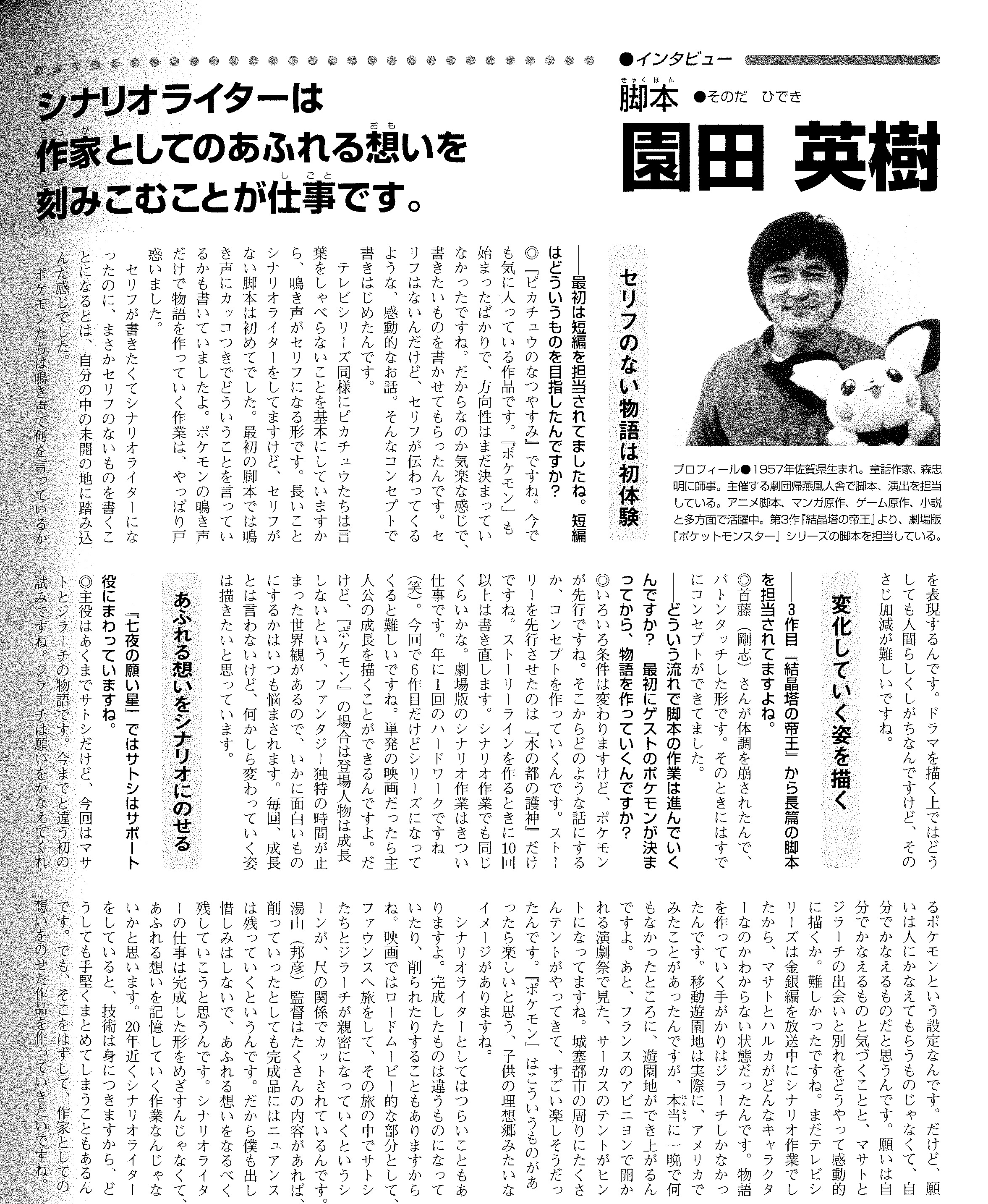

Profile: Born in 1957 in Saga Prefecture. Looked up to Mori Tadaaki, a writer of children's stories. He writes scripts and directs at the theater company he organizes, Kien Fujinsha. He is active in many fields, including anime scriptwriting, manga writing, game writing, and novel writing. He has been writing screenplays for the "Pokémon" film series since the third film, "Emperor of the Crystal Tower."
A story without dialogue was his first experience
—At first you were in charge of shorts. What kind of short stories did you aim for?
You mean "Pikachu's Summer Vacation." It is still one of my favorites. "Pokemon" had just started, and we had not yet decided on a direction. Maybe that's why I felt comfortable and was allowed to write what I wanted to write. A touching story with no dialogue, but that conveys the lines spoken. That was the concept I had in mind when I started writing.
As in the TV series, Pikachu and others don't speak, so the cries they make become the dialogue. I have been a scenario writer for a long time, but this was the first time I had written a script without dialogue. In my initial scripts, I would even write what they were saying in parentheses with the cries. I was still puzzled by the process of creating a story using only Pokémon cries.
I became a scenario writer because I wanted to write dialogue, but I never thought I would be writing something without dialogue; it was like stepping into uncharted territory for me.
Pokémon express what they are saying with their cries. In depicting drama, we tend to make them seem human, but it is difficult to find the right balance.
Portraying change
—You have been in charge of feature-length screenplays since the third film, "Emperor of the Crystal Tower."
Shudou (Takeshi) fell ill, so the baton was passed to me. At that time, the concept was already in place.
—What is the process of working on the script? Do you decide on the guest Pokémon first, and then work on the story?
The Pokémon comes first, although the conditions vary. From there, we create the concept of what kind of story we want to tell. The only time the story came first was "Guardian Spirits of the Capital of Water." I rewrite more than 10 times when I create the storyline. It's about the same for scenario work. Scenario work for a movie is intense. It is hard work once a year (laughs). This is my sixth film, but it's harder when it's a series. If it is a one-shot movie, I can depict the growth of the protagonist. But in the case of "Pokemon," the characters don't grow up, and there is a time-stopped setting unique to fantasy, so I am always struggling with how to make it interesting. I don't want to say that the characters grow, but I do want to depict them changing in some way in each film.
Putting overflowing thoughts into scenarios
—Satoshi is in a supporting role in "The Wishing Star of the Seven Nights."
The main character is Satoshi at the end of the day, but this time it is the story of Masato and Jirachi. This is the first attempt to be different from the previous ones. Jirachi is a Pokémon that grants wishes. But I don't think wishes should be granted by others, but by yourself. It was difficult to find a way to make Masato and Jirachi's meeting and parting moving. I was working on the scenario while the Gold and Silver arc of the TV series was still airing, so I didn't know what kind of characters Masato and Haruka were. The only clue to creating the story was Jirachi. I had actually seen a mobile amusement park in the U.S., where an amusement park was built in an empty space overnight. I was also inspired by the circus tents I saw at a theater festival in Avignon, France. There were a lot of tents around the fortified city, and it looked like a lot of fun. "Pokemon" has the image of a child's utopia, a place where children would have fun.
As a scenario writer, it can be tough. Sometimes the finished product is different from the original, and sometimes things get cut. In the movie, as part of the road movie portion, there was a scene where Satoshi's group and Jirachi travel to Fauns and become closer during the trip, but it was cut out for length. Director Yuyama (Kunihiko) says that if there is a lot of content, even if it is cut down, the nuances will remain in the finished product. That is why I try not to be reluctant, and try to preserve as much as possible of the overflowing feelings. I think that the work of a scenario writer is not to aim for a finished product, but to memorize the overflowing thoughts and feelings. After being a scenario writer for nearly 20 years, I have acquired a lot of skill, so I sometimes tend to put together a firm piece of work. But I would like to detach from that and create works that carry my feelings as a writer.